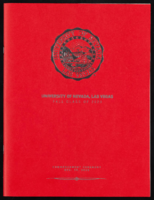Search the Special Collections and Archives Portal
Search Results

Transcript of interview with Ron Lurie by Barbara Tabach, June 5, 2015
Date
Archival Collection
Description
Interview with Ron Lurie by Barbara Tabach on June 5, 2015. In this interview, Lurie discusses his family and his time in politics, campaigning for office, and some of his accomplishments while in office as mayor and in the city council. He also talks about growing up in Las Vegas and attending Las Vegas High School, and working for his father, Art Lurie, in the grocery store business.
Ron Lurie was a rambunctious teenager when the Lurie family moved to Las Vegas from California. He adapted quickly to Las Vegas and made fast friends. He is a 1958 graduate of Las Vegas High School. His father, Art Lurie, a supermarket businessman, was also a well-known professional boxing judge and a former Nevada Athletic Commission chair. In 1987 Ron became the first person of Jewish ancestry to be elected Mayor of Las Vegas. Previously, he was fourteen year member of the Las Vegas City Council and served on many community boards and commissions. Since political office was not a fulltime position, Ron's career path developed in a couple of different ways. He tells the story of becoming a butcher and the opportunities he experienced becoming a successful salesman of gaming machines for Si Redd, IGT and others. His over three decade gaming career continues as of this oral history. He is executive vice president and general manager of Arizona Charlie's Decatur location. In this oral history he reflects on some of his political accomplishments as mayor and city councilman. He also served six years on the State of Nevada Wildlife Commission and is a member of the Fraternity of the Desert Bighorn.
Text

Transcript of interview with Richard Leigon by Stefani Evans and Claytee White, January 12, 2017
Date
Archival Collection
Description
The first part of this Shakespearean quote perfectly describes the deep admiration and love that Richard Leigon has for his father, International Brotherhood of Electrical Workers (IBEW) leader Ralph Leigon. The elder Leigon's major contributions include 39 various positions from the Nevada State American Federation of Labor and Congress of Industrial Organizations (AFL-CIO), Nevada State Democratic Party, and the Southern Nevada Building Trades Council. Richard speaks upon the early years of Las Vegas with the allure of atomic testing, going to school with future community leaders Jerome Mack, Shelley (Levine) Berkeley, and Beth Molasky as well as the role of the union in building Las Vegas. After graduating from Las Vegas High School, he attended Somona State University and obtained a degree in humanistic psychology where he furthered his father’s influence on becoming a ‘we’ person. He came back to Las Vegas to start his 40-year career as an active member of Local 357 as executive
Text

David Ober interview, October 11, 2017: transcript
Date
Archival Collection
Description
Tucson, Arizona, native David Ober moved to Las Vegas twice. He arrived reluctantly the first time in 1978 with his parents as a high-school student, when his father, Hal Ober, came to Las Vegas to begin building and marketing the U.S. Home (now Lennar) brand. While the elder Ober soon left U.S. Home to open his own home-building business, R.A. Homes, his youngest child left Las Vegas shortly after his high school graduation to return to his native Tucson, follow in the footsteps of his siblings, and attend the University of Arizona. After graduating from the University of Arizona David Ober opened his own mortgage company and began building a life in Phoenix. In the late 1980s he agreed to take a large pay cut, return to Las Vegas, and learn his father's business from the ground up. At the time, Hal Ober was developing his award-winning, master-planned community, Desert Shores. David Ober, the youngest of the five children of Hal and D'Vorre (Dee) Ober, agreed to participate in the
Text

Transcript of interview with Robert & Patricia Campbell by Stefani Evans, November 28, 2017 & March 1, 2018
Date
Archival Collection
Description
In 1976, when Bob Campbell accepted the city manager position in Henderson, Nevada, he and his family had just endured nearly a month of sub-zero temperatures in their native Missouri. Southern Nevada's mild winter coupled with the promise of developing the 8,600 acres that would become Green Valley convinced Bob and his wife, Pat, to make the move. Bob came to Henderson with a degree in public administration and city manager experience in two Missouri towns, but Green Valley offered something akin to "an artist having a blank canvas on which to plan and create." In this interview, Bob talks about the ways his career in public administration blossomed in Southern Nevada. After about five years with the City of Henderson, Campbell joined Mark Fine and American Nevada Corporation to develop Green Valley; five years after that, he moved to Southwest Gas Corporation to work with Bill Laub and later, Kenny Guinn. From about 1989 to 1997, he helped develop Lake Las Vegas. In 1994, Bob and Pat together formed The Campbell Company, a private consulting firm whose clients included Transcontinental Properties' Lake Las Vegas project as well as Henry Chen's Ascaya. v Much of the interview focuses on the Lake Las Vegas project: its original visionary, false starts, and its tumultuous development as an arm of the Bass brothers of Fort Worth, Texas; their developer, Ronald Boeddeker of Transcontinental Properties in Santa Barbara, California, and Boeddeker's appointee, Alton Jones. Along the way Campbell shares the strategies employed by the Wednesday morning group of Henderson boosters who met at Saint Peter's Catholic Church and who succeeded in gaining the necessary local, state, and federal approvals to move the project forward. He reveals the intimidation, physical threats, and sexual harassment suffered by those who questioned the way Jones did business. Overall, though, he explains why he continues to respect the Bass brothers and is still proud of Lake Las Vegas, "proud that we got it on, and proud that it's turned out to be what it is."
Text

Transcript of interview with George Pollak by Claytee White, May 25, 2010
Date
Archival Collection
Description
George was raised in Mattapan, a suburb of Boston, by his mother and father. George had four siblings and was the second youngest. George shares fond memories of growing up and playing softball and tennis in the neighborhood park with his numerous friends. George could listen to a song on the radio and play it on the piano by ear when he was as young as four years old. George had several jobs to earn money growing up, including working in a record store and as a busboy. Eventually George and his brother joined a trio with Steve Harrington and performed in clubs. In 1958, George joined his brother and Paulette Richards in Las Vegas where they had a contract to play at El Rancho Hotel & Casino where they played until it was destroyed by fire. Following the fire, George and his brother parted ways and each did their own thing. In the 1960s, George began playing with the band at Caesars Palace. George used his background in accounting to do some bookkeeping and payroll for some of the ban
Text

Transcript of interview with Pauline Barlow and Katie Ford by Caroline Logsdon, March 20, and April 7, 1976
Date
Archival Collection
Description
On March 20, 1976 Caroline Logsdon interviewed Pauline Barlow (unknown date or place of birth) about her life in Southern Nevada. Barlow first talks about her move to Las Vegas at a young age, her church membership, and her membership in social clubs. She also talks about gambling, the atomic testing, and the changes she has seen over time in Las Vegas. On April 7, 1976, Logsdon also interviewed Katie Ford (born 1929 in Ely Nevada) about her life in Southern Nevada. Ford talks about her early life and education in Nevada in Beatty, Nevada, her work with her family-owned gas station and hotel, and some of the early buildings in Beatty. She also discusses early recreational activities, the atomic testing, economic and environmental changes, improvement in technology, and social changes.
Text

Virginia Houser interview, March 20, 1978: transcript
Date
Archival Collection
Description
On March 20, 1978, collector Karen Reed interviewed her grandmother, Virginia Houser (born on August 22nd, 1912 in Bartonville, Illinois) at her home in Las Vegas, Nevada. In the interview, Virginia Houser discusses working in Las Vegas at various stores as well as changes in the Downtown and Strip areas. She also speaks about the annual Helldorado Parade and other entertainment in the Las Vegas area besides gambling.
Text

Transcript of interview with Jillian Hrushowy by Joyce Marshall, September 26, 1995
Date
Archival Collection
Description
Jillian Hrushowy arrived in Las Vegas in 1959 as part of a company hired to appear at the El Rancho Vegas Hotel in a production called La Nouvelle Eve. She has remained here (other than three short-term contracts in Reno, Nevada) until present day. She is now the production manager for Legends in Concert at the Imperial Palace Hotel. She was an only child, born in Rhodesia to English parents and raised in a home with servants and tutors. Her mother exposed her to the arts at an early age. Jillian took dancing lessons from the age of three years until she began dancing professionally. When she was fifteen years old, both parents agreed it was time for her to leave Rhodesia and finish her education in England. Living alone was difficult and lonely, but it afforded her a wealth of opportunities otherwise unavailable. She worked as a dancer in small, local productions while still in high school. When only eighteen, she got a job dancing in La Nouvelle Eve in Paris which eventually came to Las Vegas. This interview focuses on the years from Jillian’s arrival in 1959 until she retired from dancing in 1979. It follows her transitions from dancer, to principal dancer to production manager. [The first twenty minutes of the tape is warped and the text is garbled. The transcriber has lightly edited the transcript.]
Text

Transcript of interview with Howard & Dorothy Cannon by K.J. Evans, September 28, 1998
Date
Archival Collection
Description
On September 28, 1998, K.J. Evans interviewed former United States Senator Howard Cannon (born 1912 in St. George, Utah) about his life and political experiences. Also present were his wife, Dorothy Cannon, his daughter, Nancy Downing, and another participant identified as Caroline Rose. Cannon first talks about his family background and his parents’ occupations before mentioning his involvement in a music band and his pastime of flying aircraft. He then discusses his first political involvement and mentions his work for the Las Vegas City Attorney’s Office. Evans then asks about Cannon’s service with the Air National Guard and his combat experiences during World War II, specifically on D-Day. The interview then moves to a discussion on some of the work Cannon fulfilled as a senator, particularly military-based projects and black projects, and his work in creating Nellis Air Force Base. Evans later asks Cannon questions about his interaction with presidents, his thoughts on the Vietnam War, his support for civil rights, and his politically liberal stance as a lawmaker. Cannon also provides details on his relationships with Senators Walter Baring and Alan Bible, his interaction with Lyndon B. Johnson, and his campaign against Chic Hecht.
Text

University of Nevada, Las Vegas (UNLV) Fall 2020 commencement program
Date
Archival Collection
Description
Commencement program from University of Nevada, Las Vegas Commencement Programs and Graduation Lists (UA-00115).
Text
